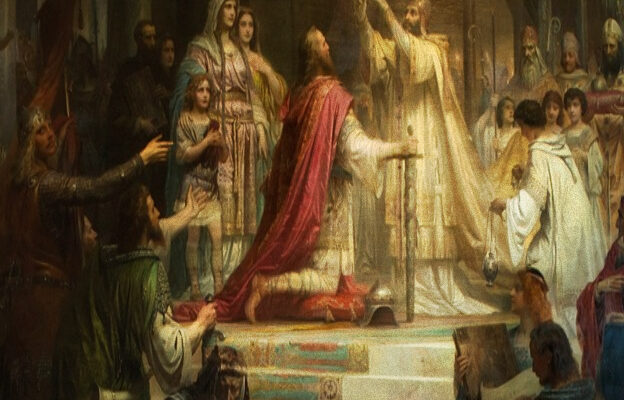Author’s Note: This is the third part in a multi-part series in which I critique the rise of paganism within certain Dissident Right circles, listing the major reasons why I think paganism is a dead end for the Right and that it will only end in disaster.
If I am being charitable, I think the origin of the “Pagan Right” sits within how the development of Western civilization has been traditionally taught. To simplify matters a bit, the classical societies of ancient Greece and Rome are typically viewed as the foundation of Western civilization, and from there on other elements, such as Christianity, were simply added to it. The “Pagan Right” takes hold of this perspective and runs with it. The pagan assertion is: if the West existed before Christianity, then Christianity and the West are separate; thus, the West’s existence is not dependent upon Christianity and the religion is, in fact, an alien accompaniment that must be rejected. This is certainly not a viewpoint I share; I reject not only its conclusion but also its premise. However, it is important to understand that the “Pagan Right” is not new and has its roots in the Enlightenment project. Its aims are to divorce the West from its historic religion, and to cast the Ancient world as the rational age and, conversely, the Medieval period, the world of Christian Europe, as an era of ignorance and superstition.
The fundamental error with this line of thinking is that is it incorrect about the origins of the West. This is where I break with both the traditional (i.e., Enlightenment) understanding of the origins of the West, as well as, the pagans who have embraced this idea. Although Greece and Rome must be considered (some) of the foundations of the West, they are not synonymous with the West. Rather, Greco-Roman societies formed a separate, albeit related, civilization – the Classical period. It is important to remember that while the Greeks and Romans were White, the idea of Whites sharing a civilization does not begin with them. Their civilizations were not “European,” but rather “Mediterranean.” Yes, it is true that the Mediterranean of the Roman Empire was far Whiter than it is today, including North Africa, the Levant, and Anatolia. Those regions would become non-White thanks to the Arab and Turkic conquests centuries later. But, it is simply incorrect to presume that the Romans had an ethnic or cultural affinity for Europeans (as a whole) or had any shared cultural values. After all, they hated and feared the barbarians. Therefore, we cannot consider the “West,” with its homeland as Europe, as originating exclusively from Greco-Roman civilizations.
Rather than having a single cultural origin, with the Greeks and Romans as its only base, the origins of the West should be understood as forming around the synthesis of three distinct cultural forces. The Classical period is one of these streams; however, the other two, Christianity and the Germanic tribes, play equally critical roles. As much as a three-legged stool cannot stand if one of its legs is knocked out, neither can the West. Each of these legs forms the West and, if one of them is removed, the West ceases to exist. Far from being a toxic foreign influence on Europeans, Christianity forged the bonds of Europe, allowing Europeans, from Norway to Spain, to share a fundamental cultural and spiritual affiliation. This does not mean that they viewed each other as the same nation, they were still well aware of the differences between a Celt and a Pole or a Spaniard and a Frenchman. The fact that Italians and Germans could (and still can) regard each other as “Westerners” would have shocked any Roman or Germanic tribesman. To the Roman, the Germani were a brutish people hellbent on destroying civilization. To the German, the Roman was a slaver. It is only Christianity that ensured Germans and Italians shared a common civilization, as both accepted Christianity.
Each of these cultural traditions, Greco-Roman, Christian, and Germanic, gave the West its identity. And, in no way can one love the West and hate one of these traditions. From the Greco-Romans came philosophy, Christianity provided neighborly and communal support, and the Germanic peoples (including the Anglo-Saxons) bestowed the understanding of freedom. This list is, of course, just scratching the surface of the gifts each tradition gave the West. Islamic civilization utilized a great deal of Greco-Roman culture, but it is not the West. Ethiopia is an ancient Christian kingdom, but it is also not the West. While no pagan Germanic nation survived, judging by what we have seen with Islam and Ethiopia, there is no reason for us to think such a nation would not be Western. Hilaire Belloc was right: “Europe is the faith and the faith is Europe.” The Christian faith made Europe and, in return, Europeans set out to spread the Gospel to every corner of the world. The real origins of the West do not reside in Plato’s Athens, but rather in Charlemagne’s Carolingian Empire. It was at this point where all three of the West’s major influences, the Classical world, Christianity, and Germanic culture, all cohesively came together.
Instead of viewing the Greco-Roman world as the sole birthplace of Western civilization, the Right should understand that it is only one part of our origin, albeit an incredibly important one. By hating, or simply downplaying one of these forces, the sons and daughters of the West are weakening a major part of their own civilization. The fact that the Left does this is one matter, they are only acting in their nature. Christianity is not a foreign interloper, but one of the three legs by which the West stands.
There is another matter on which Belloc is accurate: “Europe will return to the Faith, or she will perish.“







I agree with you … and so did Constantin Frantz:
“The entire state structure of the new Europe dates from the spread of Christianity, and has its most important moral support in the Christian faith; so that if the latter were destroyed, following it, even everything else must collapse quite automatically.” pp. 66-7. –Constantin Frantz
Alexander Jacob, ‘Europa: German Conservative Foreign Policy, 1870-1940’
Leaving this here if any are interested:
https://dowhatthouwilt.substack.com/
I disagree. I believe that no matter how Germanicized Christianity became, we will always hold the strong, noble heroes closer to our heart than the martyrs of the meek. Paganism is in our blood, just as the old testament is to the Jews. If Europe had been conquered and converted to Islam, would that make it European?